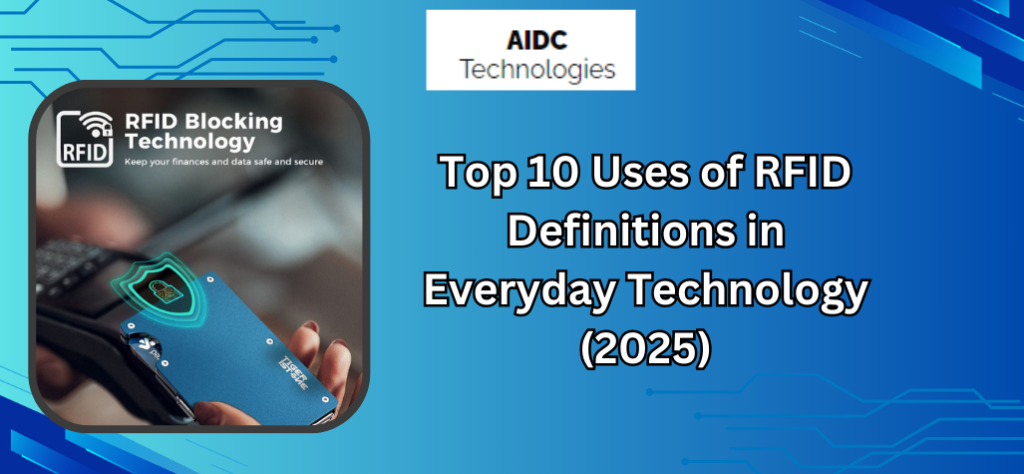
Table of Contents
ToggleTop 10 Everyday Uses of RFID Technology
Radio Frequency Identification (RFID) is a transformative technology that has reshaped various industries by enabling seamless tracking, identification, and communication. RFID definitions encompass this innovative technology's principles, terms, and functionalities. Its applications extend beyond traditional uses, offering unparalleled convenience and efficiency. Here, we explore the top 10 uses of RFID definitions in everyday technology, shedding light on how it impacts daily life.
1. Inventory Management and Tracking
One of the most prominent uses of RFID technology is in inventory management. Businesses across industries rely on RFID tags to keep accurate records of stock levels. RFID readers update inventory data in real time by scanning product tags. This eliminates manual counting errors and ensures efficient stock management. Retailers and warehouses particularly benefit from RFID systems, which enable faster restocking and reduce inventory discrepancies.
For example, a retail store can use RFID tags to track the movement of products from storage to shelves. This enhances inventory visibility and streamlines operations.
2. Supply Chain Optimization
RFID definitions play a crucial role in supply chain optimisation. RFID systems enable businesses to track goods throughout their journey by providing real-time visibility, from manufacturing to delivery. This level of transparency improves coordination among suppliers, manufacturers, and distributors.
In logistics, RFID tags attached to shipments allow companies to monitor their location, ensuring timely deliveries and reducing losses due to mismanagement. This technology also helps in identifying bottlenecks, improving supply chain efficiency.
3. Contactless Payments
Contactless payment systems have become a significant part of modern consumer experiences, and RFID technology is at their core. RFID-enabled payment cards and devices allow users to make secure transactions by simply tapping on a reader. This eliminates the need for cash or swiping cards, making payments faster and more convenient.
4. Access Control and Security
RFID definitions also encompass access control solutions for secure entry to buildings, vehicles, and restricted areas. RFID-based access cards and key fobs are widely used in offices, residential complexes, and parking facilities. These systems provide an added layer of security by ensuring that only authorized individuals gain access.
5. Healthcare and Patient Tracking
The healthcare industry is leveraging RFID technology to improve patient care and operational efficiency. RFID tags are used to control medication, track medical equipment, and keep an eye on patient movements.
In hospitals, RFID definition wristbands help ensure patients receive the correct treatments and medications at the right time. Healthcare providers may increase patient safety, lower errors, and raise the standard of care by incorporating RFID technologies.
6. Asset Management
Organizations use RFID definitions to manage their assets effectively. From office equipment to industrial machinery, RFID tags provide a reliable way to track and monitor assets in real-time. This reduces the risk of theft or loss and ensures optimal utilization of resources.
7. Library Management
RFID technology has revolutionized library management systems. RFID tags attached to books and library materials enable faster check-ins and check-outs. RFID readers automate the process, reducing the time librarians spend on manual tasks.
Additionally, RFID systems help libraries keep track of their collections, making it easier to locate misplaced or borrowed items. This enhances user experience and ensures efficient library operations.
8. Transportation and Logistics
In transportation, RFID definitions contribute to better traffic management and logistics. RFID tags embedded in toll collection systems allow for contactless toll payments, reducing congestion at toll booths.
Similarly, in fleet management, RFID systems track vehicles and monitor their routes, fuel consumption, and maintenance needs. This improves efficiency and reduces operational costs, benefiting both service providers and end-users.
9. Retail Checkout Automation
Retailers are adopting RFID technology to enhance the shopping experience. RFID-enabled self-checkout systems allow customers to scan items without manually handling each product. This reduces wait times and expedites the checkout process.
Moreover, RFID tags help retailers manage stock levels and prevent theft by providing real-time inventory updates. This ensures a smooth shopping experience for customers and operational efficiency for retailers.
10. Animal Identification and Tracking
RFID definitions are widely used in animal identification and tracking, particularly in agriculture and pet management. RFID tags implanted in livestock provide farmers with essential data on the health, location, and breeding history of their animals.
For pets, RFID microchips act as permanent identification markers. These chips store vital information about the pet and its owner, aiding in recovery if the pet gets lost.
Conclusion
RFID definitions encompass a versatile technology that has become an integral part of modern life. From inventory management and supply chain optimization to healthcare and transportation, RFID systems enhance efficiency, security, and convenience across industries. As technology continues to evolve, the applications of RFID are expected to expand further, bringing innovative solutions to everyday challenges.
Organizations and individuals can benefit greatly by understanding and leveraging RFID definitions. Whether it’s for improving business operations or enhancing personal convenience, RFID technology is undoubtedly shaping the future of technology and innovation.